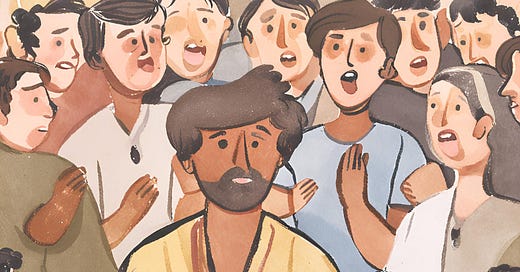The Ridiculous Rules of Being a Man
Here is a non-exhaustive list of rules men receive from boyhood. Let’s change this.
I recently had a few conversations with men about how they have felt restricted from doing something simple in their lives because they have received some message that they shouldn’t do it because they are a man.
This is not a new concept. Many of us are familiar with the phrase “boys don’t cry,” which impacts how many boys (and men) aren’t able to process their feelings and express their full range of emotions due to years of suppression.
Reflecting on this, I started to think about the other messages we receive. It’s actually incredible how many messages we receive about how we must behave to be considered men.
Here is a non-exhaustive list of messages, in no particular order, that I have heard myself or heard from others in my conversations:
Men should sit with their legs spread apart rather than crossing them at the knees.
Men should curl their fingers to look at their nails rather than extending their hand.
Men should keep their hair short.
Men should avoid speaking with expressive hand gestures or varying tones.
Men should not cry in public.
Men should not spend too much time grooming themselves.
Men should avoid showing emotions like fear, vulnerability, or sadness.
Men should limit physical affection with other men like hugging or holding hands.
Men should avoid hobbies perceived as feminine such as dancing or baking.
Men should choose careers like engineering or finance over nursing or teaching.
Men should sing in a lower register.
Men should be interested in sports, particularly contact sports like football.
Men should avoid doing household chores like cleaning, cooking or laundry.
Men should focus on providing financially for their family over taking on a nurturing role.
Men should drink. Of the drinks, men should prefer beer or hard liquor over cocktails or wine.
Men should not wear bright colors, floral patterns, or jewelry, except a watch or ring.
Men should eat meat.
Men should avoid dancing, particularly styles that are more graceful or fluid.
Men should handle conflicts with aggression instead of seeking compromise or showing empathy.
Men should not giggle.
Men should not shave body hair.
Men should not wear messenger bags or purses.
Men should watch action or adventure movies, not romance.
Men should not wear skincare products.
Men should not spend too much time with women.
Men should handle problems on their own, not seek help from friends or family.
And the list goes on….
Remember, these messages come to us both directly and indirectly. They might include disapproving glances from friends, parents, or strangers, ridicule for certain behaviors, being the butt of jokes, teasing or bullying, punishment, social exclusion, and more.
As you read through these messages, what did you think? Have you received any of these messages? What messages are missing from the list? Let us know by leaving a comment.
Ultimately, telling men (or anyone) that they must suppress their interests, identities, emotions, and more to fit into a norm is not possible. Everyone is different. Traditional masculinity is not inclusive of all men, including men from various cultures, disabled men, queer men, expressive men, empathetic men, and more.
One of the goals of healthy masculinity is to allow people to live their lives authentically and not feel they have to suppress themselves to fit a societal definition of who they should be.
Let’s change the narrative and stop trying to adhere to these expectations for the sake of it and only do what feels authentic to us. This way, we can help young boys and other men understand that they are not inadequate simply because they don’t fit these unrealistic expectations of what it means to be a man—expectations whose origins are unclear and arbitrary. By living authentically and embodying healthy masculinity, we can serve as role models, demonstrating the diverse ways men can express themselves and exist in the world.




